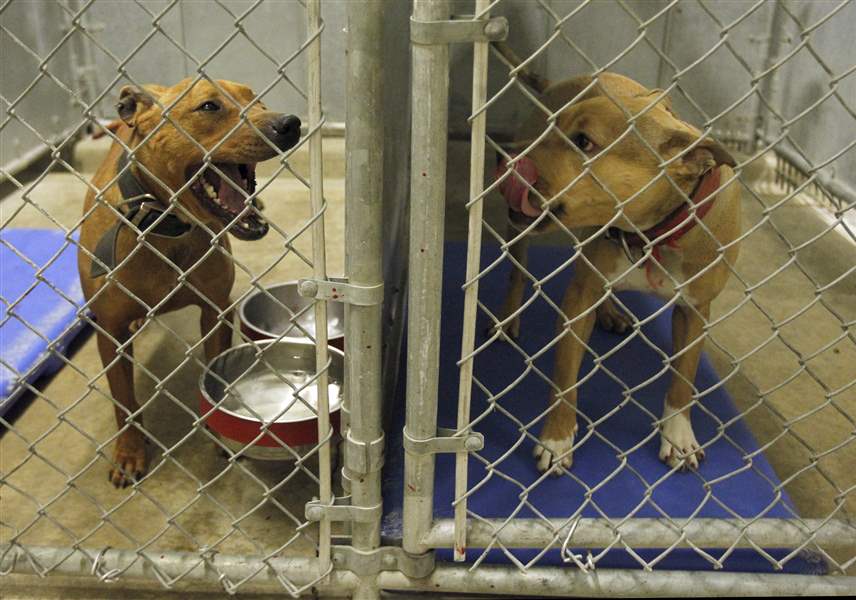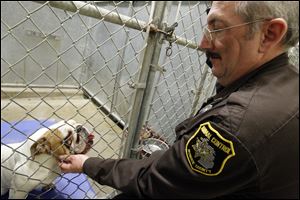
Bust shows dogfighting can be anywhere
3/13/2011
Although fighting dogs often are able to be rehabilitated, Linda Benson, director of the Monroe County Sheriff’s Animal Control Shelter, does not believe the ‘pit bulls’ confiscated in the dogfighting raid will be able to be adopted out.
The Blade/Andy Morrison
Buy This Image

David Grow, an animal control officer with the Monroe County Sheriff's Animal Control Division, pets a bull dog as it sits quietly in a kennel at the Monroe County Animal Control Shelter.
Just days earlier, Mr. Grow, an animal-control officer at the Monroe County Sheriff's Animal Control Shelter, lifted the dog into his arms, carrying it away from a dogfighting operation in Raisinville Township, Michigan. The animal is one of seven dogs rescued from a championship dog fight March 6. The two championship dogs that were fighting died.
Linda Benson, director of the Animal Control Shelter, said "shocked isn't a strong enough word" to describe her reaction when she learned the fights were occurring in her county. The raid was the first she experienced in her six years as director.

Although fighting dogs often are able to be rehabilitated, Linda Benson, director of the Monroe County Sheriff’s Animal Control Shelter, does not believe the ‘pit bulls’ confiscated in the dogfighting raid will be able to be adopted out.
Dogfighting is not limited to rural areas though, said Janette Reever, deputy manager of animal-fighting investigations with the Humane Society of the United States.
Fights happen in urban neighborhoods, in off-the-grid rural areas, and even suburbs, she said. Participants range from "unemployed drug dealers, up to people who are doctors, lawyers, priests. Every walk, and class, and type of person is involved," Ms. Reever said. In the United States, there are an estimated 40,000 dogs fighting and more than 100,000 people who participate, she said.
"It's everywhere," Ms. Reever said. "People think they don't have dogfighting in their community, but they do. It just hasn't been discovered yet."
"Several years ago, we had quite a bit of it going on," said Lt. Brad Weis, head of the Toledo police gang task force. In the past few years, the number of cases investigated by Toledo police dropped thanks to tougher dogfighting laws, he said. Still, it does happen.

Not all of the dogs confiscated in the raid were ‘pit bulls.’ A Pomeranian sits quietly in a dog carrier at the Monroe County Animal Control Shelter.
All three types of fighting — street, hobbyist, and professional — happen locally. Street fighters usually engage in informal fights on street corners or in alleys, hobbyists are more organized and fight for entertainment and income, while professional fighters usually own multiple dogs and work to breed ideal bloodlines.
When dogs are recovered from fighting operations, they're usually held in local shelters until legal proceedings are over. From there, the dogs' fates vary. Some are too vicious, too unpredictable, and are put to sleep. These dogs have often been trained to go into fighting mode based on different triggers — such as a certain sound or turning on a light.
Other recovered dogs are trained at rehabilitation centers and adopted out while some serve an even greater purpose.
Many of the dogs recovered from the Lenawee County raid were rehabilitated, trained, and now work as assistance dogs, said Bonnie Tancredi, executive director of the Lenawee County Humane Society.
"There were some that were so, so nice," Ms. Tancredi said. "They were some absolutely awesome dogs."
The dogs held in the Monroe County shelter are not able to be adopted out, Ms. Benson said.
"It's not safe, in my opinion, to release them to the public," she said.
Three of the men charged in the Raisinville Township raid — William Buchannan, 27, of Fort Wayne, Ind., Willie Fletcher, 31, and Kevin Forbes, 44, both of Detroit — will be in Monroe County District court on Friday for preliminary exams.
Anyone who suspects dogfighting should call their local authorities, Ms. Reever said. Signs include a large number of ''pit bulls'' — the fighting dog of choice in the United States — with the dogs kept in separate kennels or in a basement. Large tires or dog treadmills are used as training equipment. Dogs kept on regimented schedules, such as walks every day at the same time, could be preparing for a fight, Ms. Reever said.
Contact Taylor Dungjen at: tdugjen@theblade.com or 419-724-6054.